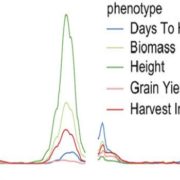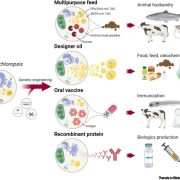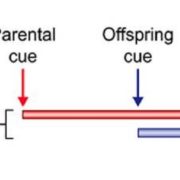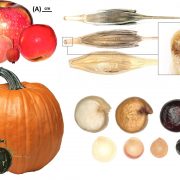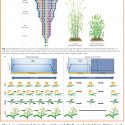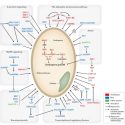Nanomaterials enable delivery of functional genetic material without DNA integration (Nature Nanotech)
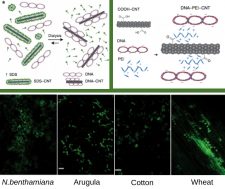 Key to success of crop improvement is the development of easier, faster and safer biomolecules-delivery systems. Here, the main limitation is the cell wall, which compromises the yield of exogenic material transfer to plant cells. In this study, Demirer et al demonstrate the advantages of infiltrated DNA-nanocarriers in monocot and dicot plants leaves (Nicotiana benthamiana, arugula, wheat and cotton) and arugula protoplasts. The authors developed two grafting methods for loading reporter GFP-encoding plasmids and linear amplicons on single and multi-walled carbon nanotubes (CNTs): using dialysis by coating CNTs with a surfactant (SDS), and using electrostatic interactions onto positively-charged, poly-ethylenimine (PEI)-coated CNTs. Internalization in the plant cell cytosol and nucleus was confirmed using Cy3-tagged DNA-CNTs with confocal microscopy, transmission electron microscopy, and near-infrared (NIR) imaging (CNTs have intrinsic NIR fluorescence). Quantitative PCR and droplet digital PCR (ddPCR) analysis showed that GFP expression is transient, which satisfies GMO regulations. Additionally, qPCR analysis of a stress gene and photosystem II quantum yield measurements revealed no sign of induced toxicity by the nanocarriers. Thus, the authors suggest CNT-mediated delivery is a highly efficient and species-independent tool, which “enable high-throughput plant genetic transformations”. (Summary by Ana Valladares) Nature Nanotechnology 10.1038/s41565-019-0382-5
Key to success of crop improvement is the development of easier, faster and safer biomolecules-delivery systems. Here, the main limitation is the cell wall, which compromises the yield of exogenic material transfer to plant cells. In this study, Demirer et al demonstrate the advantages of infiltrated DNA-nanocarriers in monocot and dicot plants leaves (Nicotiana benthamiana, arugula, wheat and cotton) and arugula protoplasts. The authors developed two grafting methods for loading reporter GFP-encoding plasmids and linear amplicons on single and multi-walled carbon nanotubes (CNTs): using dialysis by coating CNTs with a surfactant (SDS), and using electrostatic interactions onto positively-charged, poly-ethylenimine (PEI)-coated CNTs. Internalization in the plant cell cytosol and nucleus was confirmed using Cy3-tagged DNA-CNTs with confocal microscopy, transmission electron microscopy, and near-infrared (NIR) imaging (CNTs have intrinsic NIR fluorescence). Quantitative PCR and droplet digital PCR (ddPCR) analysis showed that GFP expression is transient, which satisfies GMO regulations. Additionally, qPCR analysis of a stress gene and photosystem II quantum yield measurements revealed no sign of induced toxicity by the nanocarriers. Thus, the authors suggest CNT-mediated delivery is a highly efficient and species-independent tool, which “enable high-throughput plant genetic transformations”. (Summary by Ana Valladares) Nature Nanotechnology 10.1038/s41565-019-0382-5


